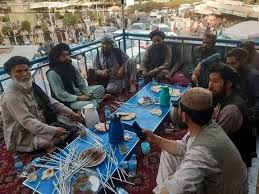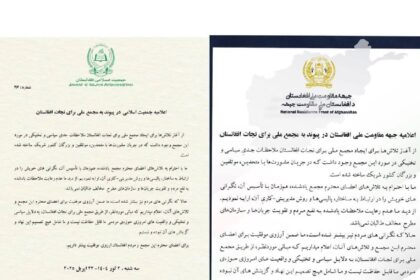RASC News Agency: Hoteliers and merchants across the Afghanistani capital, as well as in several northern provinces, are voicing growing outrage over what they describe as systematic extortion by Taliban fighters. Reports from multiple sources detail a brazen practice: armed men, freshly deployed from rural southern districts, strolling into city hotels, ordering lavish meals, and departing without settling their bills brazenly declaring the act a privilege of the mujahideen. Eyewitnesses in Kabul say the incidents are especially frequent in commercial districts such as Kote Sangi, Sarai-e-Shomali, and Pul-e-Bagh-e-Umumi. Taliban personnel, often hailing from the so-called Ministries of Defense, Interior, or the General Directorate of Intelligence, reportedly turn their daily patrols into dining excursions helping themselves to hot meals and chilled drinks before walking out without the faintest attempt to pay.
A veteran hotel owner in Kote Sangi, speaking strictly on condition of anonymity due to security risks, recounted his own confrontation:
“When we asked for payment, they replied, ‘We are mujahideen paying is not our duty.’” This culture of impunity extends far beyond Kabul. Similar accounts have emerged from Baghlan, Takhar, and Badakhshan, where Pashtun Taliban fighters, transferred from traditional strongholds such as Kandahar and Helmand, frequent hotels at midday, consume their meals, and depart without payment. In local marketplaces, vendors tell similar stories: fighters casually seizing bottled drinks, snacks, and other goods from shop shelves, leaving behind neither money nor acknowledgment.
Local business owners and community leaders say these incidents are not isolated acts of petty theft they are the manifestation of a broader Taliban ideology that views all private property as state assets, and by extension, the personal spoils of its armed cadres. The result is an unspoken but ever-present form of economic subjugation, in which ordinary citizens are coerced into surrendering their livelihoods under the shadow of the gun. Economic analysts warn that such unchecked exploitation is eroding the very foundations of Afghanistani commerce. Small businesses, already crippled by a collapsing economy and international isolation, face a stark choice: absorb these losses in silence or risk violent retaliation by resisting. Either path deepens the cycle of dependency, fear, and impoverishment that has become the hallmark of Taliban governance.
The Taliban leadership, true to its habitual silence when confronted with allegations of abuse, has offered no public comment. The absence of accountability, observers note, is not merely negligence it is part of a deliberate strategy to normalize the fighters’ predatory behavior as an accepted cost of life under Taliban rule. Business owners warn that if such practices continue unchecked, urban economic life in Afghanistan will wither. Hotels will close, markets will thin, and the modest income streams sustaining countless families will vanish further tightening the Taliban’s chokehold over both the economy and the everyday freedoms of its people.






